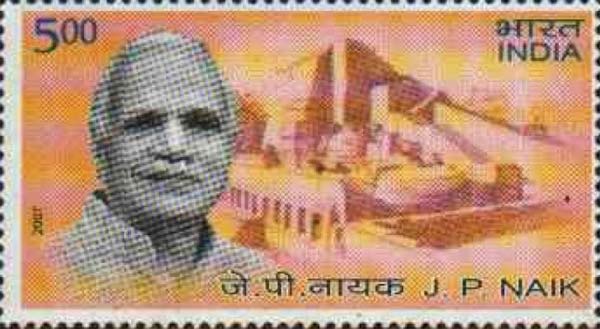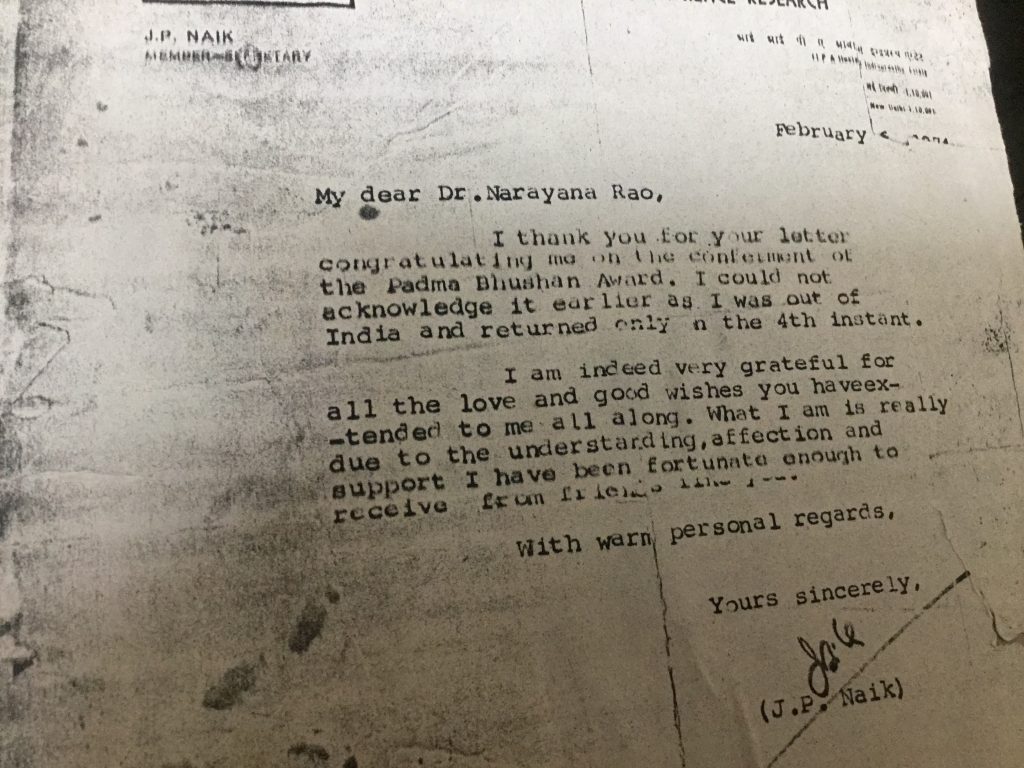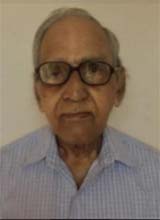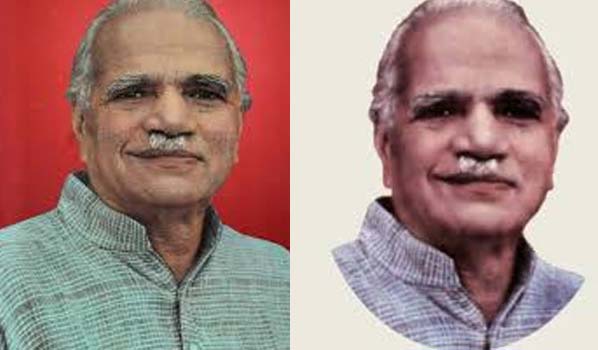Among the hundred eminent thinkers of the world.
Jayant Pandurang Naik (1907-81) was a giant of an educationist and administrator. He was named one of the world’s eminent educators ever. He was one of the six Indians in the list of one hundred great persons across the world from all fields, the others being Swami Vivekananda, Aurabindo, Mahatma Gandhi, Jiddu Krishnamurthy and Malcolm Adiseshaiah. Here is a tribute by one of JP’s associates – Editor.
Prof. Kurucheti Venkata Narayana Rao
A few months ago, the Government of India led by Narendra Modi came out with the National Educational Policy. Two decades after India became independent, and when Congress was in power, Educational Policy was announced in 1968 and was later revised in 1986 and 1992.again when Congress was in power. The first one in 1968 came after the Report of Education Commission ,headed by Kothari, then Chairman of the UGC .The policy bore the imprint of J P Naik, then advisor to the Government in the Minstry of Educaion, who served as Member Secretary of the Kothari Commission
It would be worthwhile to remember JP, as he was known to his friends and admirers, for his contribution to the field of education.
Six great Indians
PROSPECTS, a quarterly journal, of UNESCO, brought out in 1997, four volumes which profiled 100 educationists (including philosophers, statesmen, journalists, psychologists, poets, men of religion) from around the world, who left their mark on educational thought in different times till then. A list of them is available. Well known personalities like Aristotel and Confucius are there in the list. The list, so to say, the Roll Call of Honour, includes the following from India: Swami Vivekanada(1863-1902) Malcolm Adiseshaiah, (1910-94),Aurobindo (1872-1950), MahatmaGandhi (1869- 1948). Jiddu Krishna Murthy,(1895-1986) and J P Naik (1907-1981).
‘I saw Gandhi at Ongole railway station’
Of these six Indian educatonists, I never had the opportunity to see Aurobindo. Swami Vivekananda passed away decades before I was born. I happened to read in 1947, Thus Spake Vivekananda, a small booklet of quotations from Swami Vivekananda. It inspired my thoughts and actions. I was among the crowd in the railway station in Ongole to see Mahatma Gandhi who was on his way to Chennai in January 1946 for celebrations of the much delayed Silver Jubilee of Dakshina Bharat Hindi Prachar Sabha of which he was the President from its foundation till his death. That was his last visit to Chennai and the South. In March 1946 elections, I campaigned for the Congress, along with some other students from my school. I was among a group of visitors at a place in Chennai listening to Jiddu Krishna Murthy. When I was a student of MA in Presidency College (1958-1960), Malcolm Adiseshaiah, had joined UNESCO in 1948 and retired as its Deputy Director in 1970. Sometime in 1972 or 1973, he along with Prof Able of Madras Christian College, came to ICSSR office in New Delhi to meet J. P. Naik. For a few moments they sat with me before discussion with JP.
I was fortunate enough to be associated with JP for about three years which I consider as the golden period in my career
JP, the Man
JP was born in 1907 on 5th September in a small place in the then native state of Kolhapur ( incidentally ,he shares the date with S .Radhakrisnan ,which is now the Teachers day in India). He participated in the civil disobedience movement in 1930 and was jailed in Bellary. He worked for the development and reconstruction of Kolhapur. He founded the Indian Institute of Education in Pune in 1948 (It is now a Deemed University). UNESCO invited him for a Conference in Mumbai In 1952 on primary education. He was placed on the Executive Committee of the International Institute of of Educational Planning, Paris, set up by UNESCO in 1963. He was for a long period (1959 -78) with Government of India as Advisor in the Ministry of Education. He was serving only with a token salary of one rupee. He was UNESCO consultant (1960) for developmental plan for the provision of universal elementary education in Asia. He was instrumental in that period in setting up several new educational institutions – National Council of Educational Research and Training, National institute of Educational Plannig and Administrtion and JNU were some of them. He was invited by Dag Hammershold Foundation as Advisor for alternatives and innovations in education, especially for developing countries. Contribution to education comprises (a) historical writings (b) basic education (c)mass education (d) educational planning and administration (e) exercises outlining grandiose national designs for educational transformation and (f) relationship between education and society between educational transformation and social transformation. It was in this context, that he spoke of the necessity of simultaneous pursuit of Equality, Quality and Quantity in education in India ,the elusive triangle.

Member-Secretary of Kothari Commission
He was Member- Secretary of the Kothari commision on Education (1962-64). Of his contribution to education, a friend and admirer of him remarked that JP knew almost everything about Indian education and what he did not know was not worth remembering. He worked with untiring zeal as the Member Secretary of Indian Council of Social Science Research from Its inception in 1969 to 1978. He inspired social science researchers and laid a strong foundation for the path of progress of Social Science research for generations to come.
His last book “Education Commission and After” reflects on the status of education in India, a decade and a half of implementation of the Recommendations of the Commission.
My association with JP
I joined IIPA as a Senior Fellow in 1966 and was staying in IIPA hostel. JP was also staying in the hostel. Thus, we were aware of each other but had no occasion to interact personally till I left the Home Ministry in middle of 1970.
Later ICSSR was set up in 1969. It was also located in the hostel for about a decade or so. I came to be appointed as Deputy Director for the first time in ICSSR in 1970. At that time there was no director or any other Deputy Director. The job chart given to me showed that I was to help the Member – Secretary in all matters relating to (1) the committees set up for each of the Social sciences – as well as specific themes like Scheduled castes and tribes-to review the research till then and indicate priorities and (2) to provide my critical comments till a Direcor (Grants) was appointed on the project proposals, in all social sciences received by the ICSSSR, before they went to JP. Sometime later, I was directed to Issue the sanction order for approved research projects.
‘I don’t want the seat corrupted’
One Director was appointed about a year later. It was open then to JP to decide the work to be given to the Director.JP called me and appreciating my work had said that I was doing both the jobs of research Grants and committees and that the Director was to be given one of them. JP wanted me to have my option for one of them so that the Director could be given the other. I opted for research grants.
I used to apply for positions in universities .Some time in1972,JP came to my room in the office to tell me of my bright future prospects in ICSSR and to impress on me to continue to stay in ICSSR. In conclusion, believe it or not, he said “Narayana Rao, the seat you are occupying now – Head of the Grants Branch- is the most important in the ICSSR . It can get corrupted, I don’t want to see it corrupted. That is why I want you to stay on.” I do not know what made him conclude thus, but I fondly cherish that elder gentle and great man’s trust in me and.

My work
The work in the ICSSR was systematised after the Director joined. I continued as Deputy Director and Head of the grants branch and was given the powers of a Director so that I could have direct access to JP. For personal reasons, I left ICSSR in 1973 to join NIRD, Hyderabad as Deputy Director. Before I left ICSSR, JP and I had differences on certain matters. JP called me aside and said : we may have differences but let us part as friends. I did not expect those kind and noble words from him, about three decades older than me and holding such a high position of importance.
In 1974, he was awarded Padma Bhushan by govt. of India. How noble he was may be seen in his response to my letter of greetings on that occasion .The letter is reproduced below. A postal stamp was issued on JP Naik on 5 September 2007, his birth centenary year.

(The writer is a retired professor of Political Science and Public Administration, Deputy Director at ICSSR and NIRD. A J P NAIK NATIONAL FELLOW (2011). He published a number of books on the history of Andhra Pradesh and Telangana. He lives in Thiruvananthapuram.)




